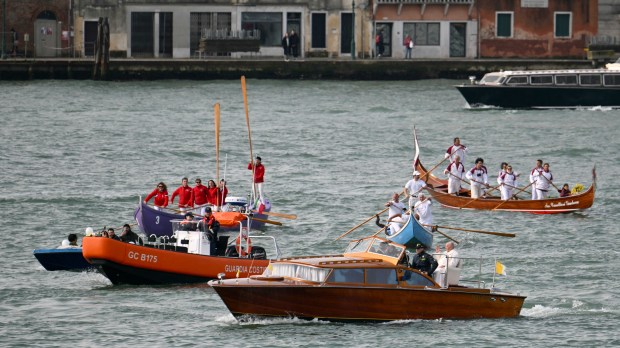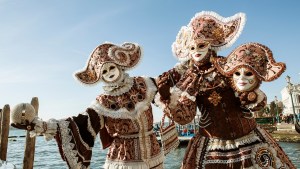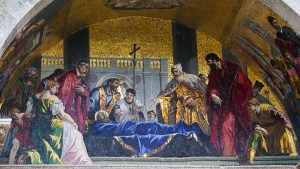Every human being bears scars from which he can heal, so prison should be a “place of rebirth,” where human dignity is protected, the Pope said in his first speech in Venice, given at a women’s prison.
The Holy Father is in northern Italy for a brief one-day trip, including a visit to the Holy See Pavilion for the Venice Biennale, housed in the Giudecca’s women’s prison facility.
In the prison’s 16th-century Baroque chapel, from whose ceiling hung a colorful fabric creation by artist Sonia Gomes, the Pope was welcomed by Cardinal José Tolentino de Mendonça, prefect of the Dicastery for Culture and Education. The Portuguese cardinal, curator of the exhibition and a key figure in the Pontiff’s visit to Venice, recalled in a brief speech that Francis was the first pope to visit the Venice Biennale, a world-famous event in the field of contemporary art.

Art as refuge
“The world needs artists,” said the Pontiff in front of eight of the nine exhibiting artists, as well as numerous political representatives. He reflected that he doesn’t feel like a “stranger” to artists, explaining that art has this capacity to become a “city of refuge” for all human beings; he invited his audience to imagine a world in which no one feels like a stranger.
Art then becomes a “city that disobeys the regime of violence and discrimination to create forms of human belonging capable of recognizing, including, protecting and embracing everyone.”
The Pontiff praised the exhibition of the Holy See Pavilion, with the theme “With My Eyes.”
Art, he said, can educate the contemplative gaze to no longer be “indifferent” to the world and to people.

“Keep rowing”
Then, in a meeting with young people, the Pope urged them to be active. He warned against the danger of becoming “couch potatoes,” overcome by the difficulties of the world. He gave them Venice as a model, “which tells us that it’s by rowing steadily that we go far.”

For this, we have to avoid being carried away or ruled only by emotions.
“I pray when I feel like it, I go to Mass when I feel like it, I do good things when I feel like it… it doesn’t produce results: You have to persevere, day after day,” he insisted.
The Pontiff urged them to go “against the current” of a society where everyone “is alone with their cell phone, hooked on social networks and video games.”
“Take charge of your life, get involved, turn off the TV and open the Gospel, leave your cell phone and go out to meet people,” he recommended, in a lively speech in which he interacted with his young audience.

Wine of God’s love
At a Mass celebrated in the plaza of St. Mark’s, the Holy Father, urged protecting both the ecological and human heritage of Venice, “one of the most evocative places in the world.”
For the Eucharistic celebration, the icon of the Madonna della Salute, particularly venerated by the Venetians, was taken out of the basilica to which she gave her name and placed near the altar.

Drawing from the Gospel of the day, the Pope paid homage to Blessed John Paul I, who was Patriarch of Venice before being elected pope in 1978. He stressed that being united to the vine does not mean “standing still, parked in passivity.” On the contrary, he urged us to grow in our relationship with God in order to produce “the wine of God’s love in the heart of man” and thus generate hope.
After Mass, the Pope spent time in prayer before the relics of the Evangelist St. Mark.




